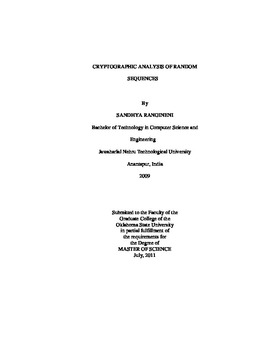| dc.contributor.advisor | Kak, Subhash C. | |
| dc.contributor.author | Rangineni, Sandhya | |
| dc.date.accessioned | 2014-04-15T18:33:10Z | |
| dc.date.available | 2014-04-15T18:33:10Z | |
| dc.date.issued | 2011-07-01 | |
| dc.identifier.uri | https://hdl.handle.net/11244/8230 | |
| dc.description.abstract | Cryptographically strong random sequences are essential in cryptography, digital signatures, challenge-response systems, and in Monte Carlo simulation. This thesis examines techniques for cryptographic hardening of random sequences that are not cryptographically strong. Specific random sequences that are considered include d-sequences, that is sequences that are reciprocals of primes, and a new sequence obtained by the use of a specific two-dimensional mesh array. It is shown that the use of many-to-one mapping on blocks of the raw sequence improves the quality of autocorrelation function. Various types of many-to-one mappings are used and their effect on the autocorrelation function is compared. Sequences are also compared using another measure of randomness. | |
| dc.format | application/pdf | |
| dc.language | en_US | |
| dc.publisher | Oklahoma State University | |
| dc.rights | Copyright is held by the author who has granted the Oklahoma State University Library the non-exclusive right to share this material in its institutional repository. Contact Digital Library Services at lib-dls@okstate.edu or 405-744-9161 for the permission policy on the use, reproduction or distribution of this material. | |
| dc.title | Cryptographic Analysis of Random Sequences | |
| dc.type | text | |
| dc.contributor.committeeMember | Thomas, Johnson | |
| dc.contributor.committeeMember | Kapil, Sanjay | |
| osu.filename | Rangineni_okstate_0664M_11591.pdf | |
| osu.college | Arts and Sciences | |
| osu.accesstype | Open Access | |
| dc.description.department | Computer Science Department | |
| dc.type.genre | Thesis | |
